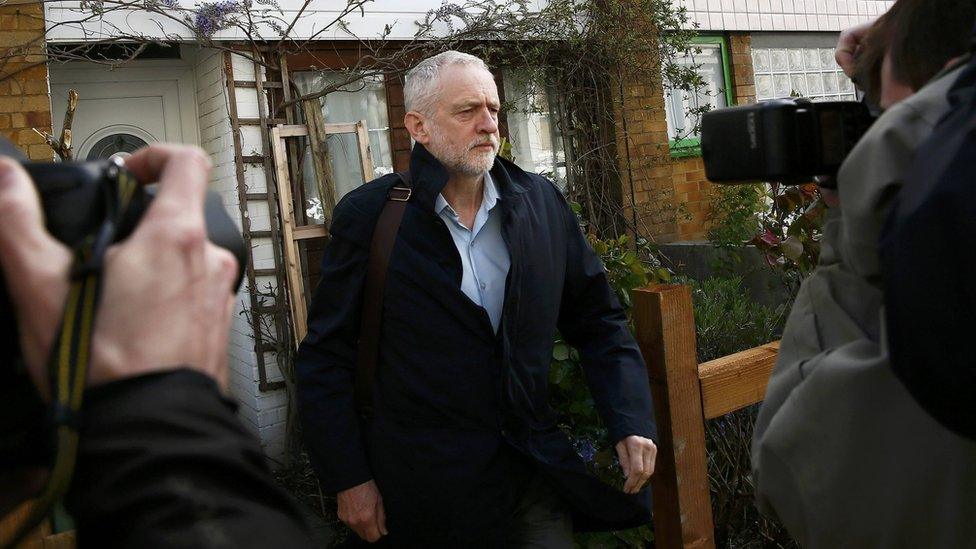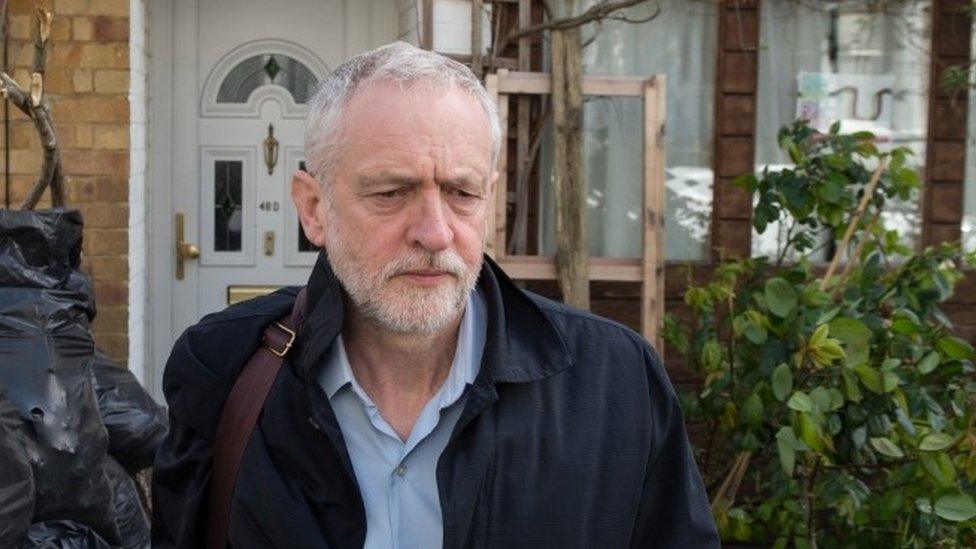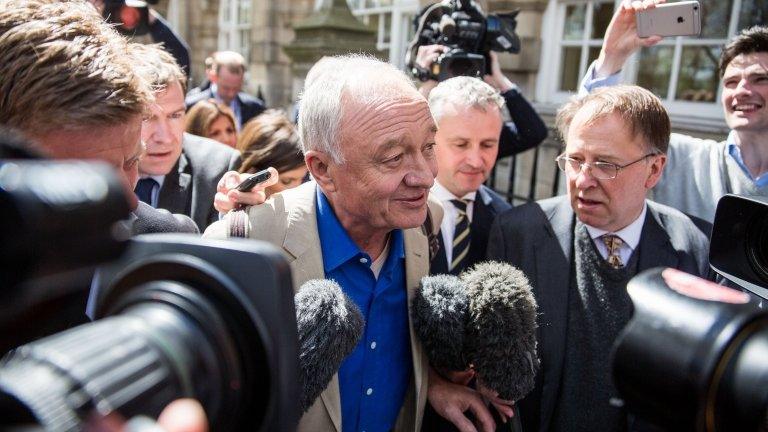Labour anti-Semitism row: Jeremy Corbyn to launch inquiry
- Published

Jeremy Corbyn is to issue guidance on "acceptable behaviour and use of language"
Jeremy Corbyn is to hold an independent inquiry into anti-Semitism and other forms of racism in the Labour Party.
The inquiry, led by Shami Chakrabarti, former head of campaign group Liberty, will consult with the Jewish community and other minority groups, Labour said.
Mr Corbyn will also propose a new "code of conduct" on racism at Labour's national executive committee in May.
It comes after the party suspended MP Naz Shah and ex-London mayor Ken Livingstone amid anti-Semitism claims.
The code of conduct will include guidance on "acceptable behaviour and use of language" and make "explicitly clear for the first time that Labour will not tolerate any form of racism, including anti-Semitism, in the party", a statement said.
The inquiry's vice-chairman will be Professor David Feldman, director of the Pears Institute for the Study of Anti-Semitism.
The inquiry, which will report in two months, will set out "clear and transparent" rules on how the party should deal with allegations of racism and anti-Semitism and propose training programmes for parliamentary candidates, MPs and councillors.

Anti-Semitism and Zionism
Anti-Semitism is "hostility and prejudice directed against Jewish people" (OED)
Zionism refers to the movement to create a Jewish state in the Middle East, corresponding to the historic land of Israel - anti-Zionism opposes that
Some say "Zionist" can be used as a coded attack on Jews, while others say the Israeli government and its supporters are deliberately confusing anti-Zionism with anti-Semitism to avoid criticism.

BBC political correspondent Ben Wright said Jeremy Corbyn would be hoping the announcement would "calm what was now a very angry, volatile atmosphere within his party".
Mr Corbyn said Labour was an anti-racist party "to its core", and the Jewish community had been at the heart of the Labour party and progressive politics in Britain for more than 100 years.
"There is no place for anti-Semitism or any form of racism in the Labour party, or anywhere in society, and we will make sure that our party is a welcoming home to members of all communities," he said.
The Labour leader said he had taken "decisive action" over any such allegations since he became leader.
The row, which comes less than a week before local elections in England, and for the devolved administrations in Scotland, Wales and Northern Ireland, exploded on Thursday when Mr Livingstone claimed Hitler supported Zionism "before he went mad".
He made the comments in an interview with BBC Radio London, in which he defended Ms Shah, the party's MP for Bradford West.
Zac Goldsmith, the Conservative candidate for London Mayor, said it was "not a Ken Livingstone problem - it's a Labour party problem".
He told the BBC: "There is a streak running through the Labour party - I don't think the Labour party even denies it - where anti-Semitism of the most aggressive form has become normalised."

Analysis
By John Peinaar, BBC deputy political editor
There will be those Labour MPs who welcome the inquiry as measurable progress, but will it satisfy Jeremy Corbyn's most committed critics? No it won't.
They don't trust his instincts. They remember him sharing platforms in the past with militants from Hamas, or from Iran.
They resent the fact he draws support from some far-left individuals and groups who have been associated with anti-Semitism in the past.
More fundamentally, this is just one component of a charge sheet for them that touches on Jeremy Corbyn's pure left instincts and his basic competence.
The tension beneath the surface between these rival groups in the Labour Party borders and crosses over into hatred.
It will come to the surface after the local and national elections next week and will likely boil over when the European referendum is settled one way or another in June.

Ken Livingstone said Naz Shah's comments were not anti-Semitic
Ms Shah was suspended on Wednesday over comments on Facebook, including a suggestion that Israel should be moved to the United States. She later apologised.
In the interview, Mr Livingstone said: "When Hitler won his election in 1932 his policy then was that Jews should be moved to Israel. He was supporting Zionism before he went mad and ended up killing six million Jews."
'Nazi apologist'
He was later confronted outside the BBC's studios by Labour MP John Mann, who accused him of being a "Nazi apologist" in front of TV cameras.
And Jonathan Ashworth, a member of Labour's shadow cabinet, told BBC Radio 4 that Mr Livingstone's comments were "deeply offensive, it was vile".
Labour MP Ruth Smeeth said it had been a "horrendous" week for the party but hoped the inquiry would "help us now rebuild".
Mr Livingstone was suspended by Mr Corbyn, who said there had been "grave concerns" about the language used.
Slow reaction
Anushka Asthana, political editor at the Guardian, who was following Mr Corbyn for an interview on the day the row erupted, told the BBC the Labour leader tried to carry on with his planned visits before advisors made it clear he needed to take action.
"It was obviously quite a difficult thing for him to do... he is an old friend of Ken Livingstone," she said.
"[Labour] had to set up this inquiry because of all the questions, but there is a reluctance, I think, among the inner circle to accept that all of this is around anti-Semitism. But they have to shut this down. There is fury throughout the party."
Jonathan Sacerdoti, from the Campaign Against Anti-Semitism, welcomed Mr Corbyn's inquiry but said the party was still reacting too slowly.
"We've seen more and more of these stories coming out about people in the Labour party, and it can't be denied that the modern left has within it a strain that does seem to have anti-Semitic views.
"That's a problem the Labour Party has been very slow to acknowledge and very slow to deal with."
On Friday, Mr Livingstone told Sky News he would make his case citing a book by controversial American Marxist historian Lenni Brenner, who he met in the 1980s.
"I'll just produce the evidence... it's hard for somebody to decide to suspend me from the party here when all this was there 30 years ago in the public domain and nobody raised a peep," he said.
- Published29 April 2016

- Published29 April 2016

- Published29 April 2016
